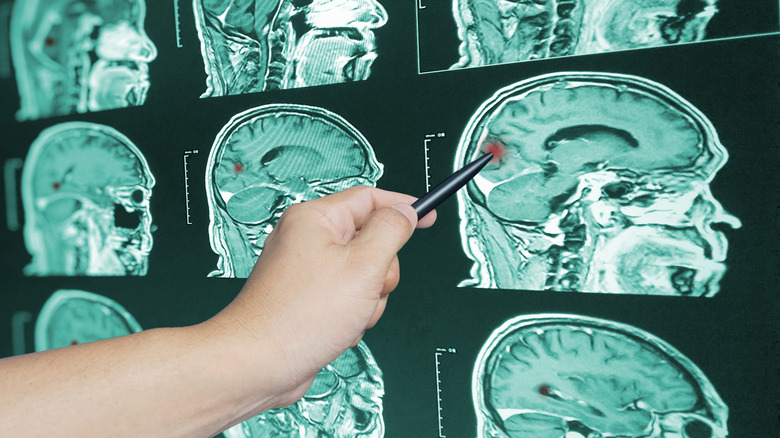Negative Effects Belly Fat Can Have On The Rest Of Your Body
Whether from the holiday season or the pandemic pounds, everyone has a bit of belly fat. While the bulge under your shirt might not be the most appealing in pictures, looks are deceiving. Someone who looks skinny might be more unhealthy than someone with noticeable love handles because of the large amounts of fat tucked deep in their body. Scientists have come to realize that it's not just having belly fat, but where it is that matters.
When you think of belly fat, chances are you're thinking of subcutaneous fat. According to Harvard Health, subcutaneous fat makes up 90% of belly fat, but only takes into account fat under the skin. It's the other 10% of unseen belly fat called visceral fat that is the problem. Visceral fat is under the abdominal wall and nests itself into the spaces between your organs. Research suggests that women are more likely to have visceral fat in their midsection than men. Visceral fat cells contribute to several health conditions by releasing chemicals and fatty acids into the bloodstream. These chemicals then increase the production of cholesterol in the blood.
Here are some other reasons why belly fat impacts more than just your figure.
Belly fat increases your risk for type 2 diabetes
The dangerous type of fat that surrounds your abdomen could be the underlying cause behind developing type 2 diabetes. According to Harvard Health, fat cells in your abdomen are able to produce hormones and other chemicals that disrupt the natural balance in your body.
One example is visceral fat's production of inflammatory proteins called cytokines. Cytokines are important for immune health, but overactivity can damage nearby cells and suppress insulin-signaling pathways. Doing so makes the body less responsive to the presence of insulin and increases the risk for diabetes as blood sugar levels remain uncontrolled in the body.
According to Health, having fat around the belly carries more health risks than having fat in the thighs or buttocks. "No one would say overweight is healthy," said Dr. Lewis Landsberg of the Northwestern University Comprehensive Center on Obesity in Chicago. "The message is that being overweight is much more unhealthy for some people than others."
Too much belly fat can affect your mental health
With social media glamorizing skinny influencers as the standard for beauty, you may find it hard to love your love handles. And while findings suggest that the stigma of weight can harm your mental health, research shows belly fat itself can change how your brain is wired.
A 2021 study found that obesity increased the likelihood of developing depression and anxiety. Women, who are more likely to gain fat when they become older (per the New York Times), have also been known to be highly affected by anxiety if they experience abdominal obesity.
Belly fat may also have an indirect effect on mental health. Research published in the journal Neurology found an increased waist and fat can decrease the gray and white matter regions of the brain and overall brain size. Additionally, the study authors found that an increase in waist-to-height ratio was linked to the size of several brain regions such as the caudate, putamen, pallidum, and the nucleus accumbens. The nucleus accumbens is an important brain area that controls behaviors involved in addiction and depression.
Abdominal fat can lead to early death or disability
Unless you're Edward Cullen, death is inevitable. But that doesn't mean you can't do everything in your power to delay it. One way is to work on reducing the fat around your stomach.
A 2019 study showed evidence that women with a high waist circumference but were considered to be of normal weight or a healthy BMI had a greater mortality risk than women without excess belly fat. Moreover, a 2020 study published in The BMJ found that excess fat in the midsection is associated with premature death. In fact, for every extra 10 centimeters of waist circumference, the chances of dying early rose by 11%.
According to Harvard Health, the reason for the increased mortality risk likely comes from visceral fat being harmful to your metabolism and other body organs. It can promote the release of inflammatory proteins that increase the risk for type 2 diabetes and heart disease.
A potbelly increases your risk of heart problems
Your waist size could serve as a clue to your heart health. The American Heart Association made a statement in 2021 citing evidence that belly fat — particularly the underlying fat that surrounds the organs — increases the risk of heart disease.
Additionally, waist size is said to be a better predictor for heart problems, even if you are in range for a healthy BMI. Indeed, one study in the European Journal of Preventive Cardiology found that women with large waists had double the risk of heart disease. Another study published in 2020 suggested a strong association between a large waist or excess belly fat and repeat heart attacks.
"As little as 5 percent weight loss can lead to improvements in health markers in those with overweight and obesity," said Dr. Marie-Pierre St-Onge, AHA guidelines senior author and associate professor of nutritional medicine at Columbia University Irving Medical Center to Everyday Health. "For those with a BMI in the normal range, but with a larger midsection, weight loss could also be helpful."
Excess body fat may cause cancer to develop in your body
Science shows that people with more fat in their midsection are at a higher risk of developing multiple types of cancer. A 2019 study published in Nature Communications found that belly fat is a stronger predictor for cancer than your body shape and size. Researchers reported a 33% increased risk of cancer in men with obesity and a 22% risk in women with obesity.
Meanwhile, a 2016 study in the European Journal of Cancer also associated abdominal fat with a greater risk of developing breast cancer in women. There was good news, though: The same study found that women who lost about 12 pounds significantly reduced their cancer risk.
The effects of belly fat also extend to an increased risk of gastric cancer and esophageal cancer, according to a 2017 review on abdominal obesity. Research linked strong evidence between having a large waist with an increased risk of lung cancer and developing an aggressive form of prostate cancer. The greater risk of prostate cancer may come from elevated levels of a protein called prostate-specific antigen, which could come from weight-related hormone changes. Lastly, a 2020 study published in Cancers found that people with a high waist and large belly fat were associated with higher colorectal cancer risk.
Belly fat makes it harder to breathe
Going for a run while being out of shape is bound to have you gasping for breath. But for people with a large midsection, the excess fat can make it harder to breathe and put you at risk for respiratory conditions.
A 2009 study in Thorax that analyzed over 80,000 women found that having a large waist increased the risk of asthma and having recurring asthma attacks. People who were considered to be of normal weight had similar risks if they had hidden abdominal fat. According to the American Lung Association, there are multiple explanations why people carrying extra weight around have an increased risk of asthma. Excess fat around the chest and abdomen can tighten the lungs and make it harder to breathe. Additionally, fat tissue has properties that increase inflammation that could impact the lungs and cause asthma.
There is also a severe disorder called obesity hypoventilation syndrome where people with excess fat in areas such as the neck, chest, or belly have a harder time breathing. The National Institute of Health explains that the condition is life-threatening, since it leaves you with more carbon dioxide than oxygen in the lungs. Fortunately, breathing problems such as obesity hypoventilation syndrome are reversible with weight loss. A 2016 review on obesity says that weight loss, regardless if it was through diet or surgery, can lead to a massive improvement on breathing by improving your lung function.
Belly fat changes the way your brain works
Your body reaches its peak in its late twenties — and if you're not actively exercising, it will become much easier to lose muscle and pack on the pounds. As you get older, so does your brain. Research shows belly fat can speed up that process.
A 2008 study in Neurology found that people with belly fat were about three times more likely to develop dementia 30 years later than people with little belly fat. Another study published in 2020 in the International Journal of Epidemiology found a link between belly fat and a greater risk of dementia. However, the effects were more pronounced in women. Women with abdominal fat had a 39% greater risk of developing dementia. "As belly size gets larger, the memory center in the brain gets smaller, based on prior studies," Dr. Richard Isaacson, founder of the Alzheimer's Prevention Clinic at Weill Cornell Medicine and New York-Presbyterian Hospital, told CNN. "Combining these findings with my clinical experience, I have seen greater impact on visceral fat on memory function in women, likely mediated by metabolic pathways."
An expanding midsection can also have indirect effects on your cognition. A 2019 study showed that belly fat caused changes to immune cells called lymphocytes and eosinophils in women, as well as changes to a white blood cell called basophils in men. These changes were linked to a person having worse fluid intelligence — not being able to think abstractly and solve problems.
Having a large abdomen can make your back hurt
You've probably heard the nursery rhyme 'step on a crack, break your mother's back,' but the more accurate — and probably less fun — version is getting some belly fat and throwing your back out of whack.
According to Verywell Health, the connection between excess fat and lower back pain is still up for debate, but the research supporting the claim that obesity puts stress on the pelvis, back, and spine is strong. A 2016 study in BMC Public Health found that people with a high waist to hip ratio experienced more chronic low back pain. Additionally, a 2017 study in Japan found that a man's BMI and percentage of fat were directly related to chronic lower back pain.
There appear to be other factors that can strengthen obesity's effects on lower back pain. While research suggests obesity in both men and women is a risk factor for back pain, a separate study found that people with obesity who also have a mood disorder such as anxiety or depression were more likely to experience severe or debilitating lower back pain.
Belly fat could make you more likely to have a future stroke
Heart attacks are not the only heart problems caused by belly fat. Research tracking more than 10,000 patients over a 5-year period found that visceral fat (rather than BMI) was associated with future strokes. Indeed, more research has come to light on belly fat alone being the main culprit for stroke. A genetic study found that regardless of blood sugar levels, people genetically predisposed to abdominal obesity are at an increased risk for developing a stroke (via the Annals of Neurology).
A 2017 study in The Lancet Public Health found that people who are overweight have double the risk of having a stroke. More recently, a 2020 study published in the European Journal of Preventative Cardiology found that people with excess fat around their abdomen who experience a heart attack or stroke have a greater risk of getting a second one. "Maintaining a healthy waist circumference is important for preventing future heart attacks and strokes regardless of how many drugs you may be taking or how healthy your blood tests are," Hanieh Mohammadi of the Karolinska Institute in Stockholm told CNN.
Losing belly fat can help you appear taller
No one wants to look like the hunchback of Notre Dame. While standing up straight is a quick fix, people with belly fat are at risk of having poor posture. A 2014 study published in Obesity Surgery confirmed a relationship between belly fat and poor posture. Fortunately, losing weight helped with improving a person's posture a year later.
Poor posture affects everyone, regardless of age. A 2018 study in BioMed Research International showed that school-age children and adolescents with a high BMI were significantly more likely to have poor posture in the pelvis and shoulder area. The effect was more pronounced in girls. In young adults, one research study found poor posture came increased belly fat and excessive curvature of the spine (via Osong Public Health and Research Perspectives). Another study in women with obesity showed that fat can cause physical deformities to the back and spine that can make it physically difficult to correct oneself in an upright position (per PLOS One).
Too much belly fat can make it harder to sleep
Sleep is important in resetting the body for the next day, but research shows that having too much visceral fat can keep you tossing and turning all night.
A 2021 study published in Frontiers in Endocrinology found that excessive belly fat threw off 31% of adolescents' sleep schedules. Adolescents with too much belly fat were more likely to sleep for less than 9 hours a day. On the other end of the spectrum, adults with high visceral fat have trouble sleeping as well. A 2014 study in Obesity found that the greater the visceral fat, the shorter the amount of sleep adults got per night. Moreover, research showed that people with high visceral fat were more likely to develop sleep conditions such as moderate or severe sleep apnea.
Maintaining visceral fat for a long period of time can cause lasting damage to your sleep health. In one study looking at increases in visceral fat over 5 years, scientists observed extreme changes to people's sleep schedules, including sleeping less than the recommended amount or oversleeping (via Sleep).
Gaining weight can make it harder to have an erection
We've all heard that we need to get off the couch and move more for our health. But if that's not a good enough reason for you, here's one that should get men in line to the gym — excess belly fat can make it harder to have and maintain an erection. "If you can't see your penis, that's a problem," explains Dr. Kevin Billups, an associate professor of urology at the University of Minnesota (per CNN Health).
According to Verywell Health, obesity causes high inflammation, which disrupts hormones released in your endocrine system and the inner lining of blood vessels. Problems with blood vessels can make it harder to move from an open to closed state, restricting blood flow. "If blood flow cannot increase because the blood vessels can't dilate normally, then there's a decrease in erectile function," Dr. Robert Alan Kloner, a cardiologist and professor of medicine at the University of Southern California's Keck School of Medicine, told CNN Health.
The relationship between obesity and erectile dysfunction seems to be due to fat around the belly. A 2017 study found men with higher body fat but with more visceral fat in particular experienced higher rates of erectile dysfunction. Of course, problems with your sexual performance could also be psychological, such as feeling insecure about how you look. However, research shows that situations with erectile dysfunction come more from the build-up of visceral fat than the psychological effects of obesity.
Belly fat can help fight bacterial infections
For as much as you might hate the jelly rolls on your tummy, there is some benefit to having fat. Research shows belly fat boosts the immune system and makes them better equipped to do their job.
A 2021 study in Nature Communications suggests that immune cells convert fat into energy and help create millions more white blood cells when faced with a Salmonella infection. "Fighting infection takes a lot of energy and fat stores are huge energy deposits, which provide the fuel for the blood stem cells to power up the immune response," Stuart Rushworth, study co-author and associate professor from the University of East Anglia's Norwich Medical School, said in a press release.
Fat has other ways of helping the immune system as well. A 2015 study found that fat cells called adipocytes create antimicrobial peptides that help ward off bacteria and other dangerous pathogens like the ones that cause staph infections. Of course, this is one benefit compared to the dozens of reasons excess fat is not good for you. Plus, there is a limit to how useful it is for immunity. A 2019 review in Frontiers in Endocrinology explains there is an "obesity paradox," in which having excess fat has a detrimental effect on your immune system overall. However, there is evidence that it also increases your chances of survival with pneumococcus infections.
Belly fat leads to bladder problems (and could explain why you're peeing your pants)
If you find yourself running to the bathroom during the wee hours of the night, it could be an unfortunate side effect of high belly fat.
According to the Continence Foundation of Australia, excess body fat puts pressure on the bladder and bowel making it hard to control the release of urine, feces, or flatulence. The pressure can also cause the pelvic floor muscles — muscles that support the bladder and bowel — to grow weaker over time, which further contributes to accidental leakage. Indeed, a 2016 study found that women with large waists were more likely to have a loss of bladder control, frequent urination at night, and urinary tract infections.
The fat putting pressure on the abdomen and internal organs seems to be coming from visceral more than subcutaneous fat. A 2020 study found that women with high levels of visceral fat reported more instances of an overactive bladder. The U.S. News & World Report says that feeling the need to urinate and not being unable to hold it in when sneezing, laughing, or jumping could also come from the push the extra fat adds to these organs in your body.















